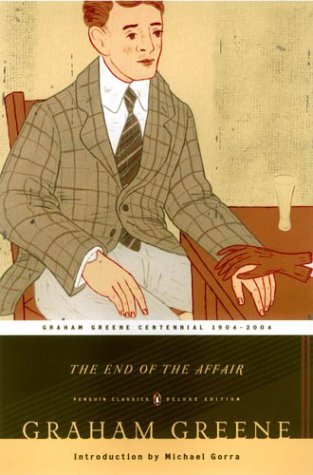The End of the Affair

Š http://ecx.images-amazon.com/images/I/51KEEPHMMFL.jpg
The End of the Affair (1951) is a novel by
British author Graham Greene, as well as the title of two feature films
(released in 1955 and 1999) that were adapted for the screen based on the
novel.
Set in
Graham Greene's own affair with Lady Catherine Walston played into the basis for The End of the Affair.
The British edition of the novel is dedicated to "C" while the
American version is made out to "Catherine." Greene's own house at 14
Clapham Common Northside
was bombed during The Blitz.
Synopsis
The novel focuses on Maurice Bendrix,
a rising writer during World War II in
Bendrix and Sarah fall
in love quickly, but he soon realizes that the affair will end as quickly as it
began. He picks fights with her out of jealousy, but she remains patient. He is
frustrated by her refusal to divorce Henry, her amiable but boring husband.
When a bomb blasts Bendrix's flat as he is with
Sarah, he nearly dies. After this, Sarah breaks off the affair with no
explanation.
Two years later, Bendrix is
still wracked with jealousy when he sees Henry crossing the Common that
separates their flats. Henry has finally started to suspect something, and Bendrix decides to go to a private detective to discover
Sarah's new lover. Through her diary, he learns that she made a promise to God
not to see Bendrix when she thought he was dead after
the bombing. Greene describes Sarah's struggles with Catholicism, though it is
an odd version of the faith, more like Jansenism. After her sudden death from
pneumonia, several almost-miraculous events occur, though it is not clear what
Greene expects the reader to think. By the last page of the novel, Bendrix has come to believe in a God as well, though not to
love him.
The End of the Affair is the fourth and last of
Greene's explicitly Catholic novels, and is widely regarded as his best work.
Though Greene disliked being referred to as a Catholic writer, his most
powerful novels were about Catholic themes. He discusses faith in an unusual
way in the novel, often referring to it as an infection or a disease, something
one can catch like a cold. Unlike his other Catholic novels, there is no talk
of damnation, only a kind of salvation. The introduction of supernatural
elements is also new for Greene.
Adaptations
In 1955, the book was made into a film, directed by
Edward Dmytryk, with the screenplay adaptation by
Lenore J. Coffee. David Lewis was the producer and David E. Rose executive
producer. It starred Deborah Kerr as Sarah Miles, Van Johnson as Maurice Bendrix, John Mills as Albert Parkis,
and Peter Cushing as Henry Miles.
In 1999, the novel was again made into a movie (The
End of the Affair), directed by Irish director Neil Jordan.
In 2004, Jake Heggie
composed an opera based on the novel. It premiered at the Houston Grand Opera
in March of that year, and was subsequently revised into its final form.
Š http://en.wikipedia.org/wiki/The_End_of_the_Affair